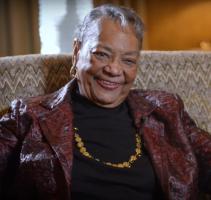 In honor of both Women’s History Month and last month’s Black History Month, an updated repost about the barrier-shattering naval engineer Raye Montague, who died at the age of 83 in 2018.
In honor of both Women’s History Month and last month’s Black History Month, an updated repost about the barrier-shattering naval engineer Raye Montague, who died at the age of 83 in 2018.
At the age of 7, she was inspired to become an engineer after she toured a captured World War II German submarine with her grandmother. As an African-American girl, however, she was told that becoming an engineer was simply not an option.
Thirty years later, Raye Montague became the first person to use a computer program to rapidly develop a preliminary ship design for the U.S. Navy. The design process had previously taken the Navy two years. Montague completed the preliminary design of the Oliver Hazard Perry Class frigate in less than 19 hours. Her accomplishment revolutionized the way the Navy designs ships and submarines.
She later worked on the designs of the Seawolf-class submarine and the Nimitz-class aircraft carrier Dwight D. Eisenhower.
Raye Montague would become the program director for the Naval Sea Systems Command (NAVSEA) Integrated Design, Manufacturing, and Maintenance Program, the division head for the Computer-Aided Design and Computer-Aided Manufacturing (CAD/CAM) Program, and deputy program manager of the Navy’s Information Systems Improvement Program. In 1972, she was awarded the Meritorious Civilian Service Award.
Despite her accomplishments, Montague was largely invisible to the public and often to her colleagues. As noted by the New York Times:
Although she was decorated by the Navy, Ms. Montague, who retired from the service in 1990, was not acknowledged publicly until 2012, when The Arkansas Democrat-Gazette wrote an in-depth profile of her.
She was not recognized nationally until the publication in 2016 of “Hidden Figures,” Margot Lee Shetterly’s best-selling account of the black female mathematicians at NASA who facilitated some of the nation’s greatest achievements in space. Their acclaim was amplified later that year when the book became an Oscar-nominated movie.
The Navy honored Ms. Montague as its own “hidden figure” in 2017. She was inducted into the Arkansas Women’s Hall of Fame in 2018.

An amazing children’s book about Raye Montague is “The Girl With a Mind for Math,” by Julia Finley Mosca. The cheerful but frank tone evokes the bravery and determination this brilliant woman used to counter racist barriers that sprung up right from the moment her desire to build ships was voiced. If you have a budding engineer or mathematician in your family, it is truly inspirational–and unlikely to be read without heartache.